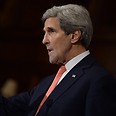
Obama to Israelis: We're not abandoning you
Netanyahu still at odds with US president, secretary of state over Iran, peace deal, but American politicians make it clear to Palestinians, Iranian that Jewish State will remain protected. But what does this message mean for Israel?
US Secretary of State John Kerry's ardent speech on Saturday in the Saban Forum managed to overshadow that of US President Barack Obama.
Kerry was adamant and clear when speaking in praise of diplomacy and peacemaking – both in the context of solving the Israeli-Palestinian conflict and in the context of preventing a nuclear Iran. Obama sounded more like a skilled lawyer, attempting to sway a jury. Kerry's passion has a good chance of winning, especially in regards to the peace process.
Kerry, like Obama, went over the heads of Prime Minister Benjamin Netanyahu and Defense Minister Moshe Ya'alon, and spoke directly to the Israeli public and pro-Israeli US-Jews. The core of his message: Diplomacy is preferable to raw power, either through sanctions or military actions. It can achieve more and cost less, in terms of the damage raw power can cause. Like his president, Kerry also stressed that Israel's security is at the top of the US's priorities, because Israel's security is also the US's security.
Kerry had no new input regarding the interim Geneva deal with Iran, and, like Obama, also failed to elaborate on what the US hopes to achieve in a final agreement with Iran.
But he did surprise by articulating clearly what the talks' end-game are: To push Iran significantly farther from being a nuclear threshold nation.
Neither said how far Iran should be – or currently is – from such a goal, but in somewhat of a first they did clearly state that to be the goal.
Obama: 'We’re taking that (redline) down to zero'
This goal is not Netanyahu or Ya'alon's goal. They demand an Iran incapable of "breaking" the threshold towards a nuclear bomb. Or in other words: Not only are the US and Israeli redlines different, but there are serious gaps between the two allies regarding what a permanent agreement with Iran should entail.
The US does not expect Iran to stop enriching uranium, and a word regarding arms development has yet to be heard – not about warheads or ballistic missiles (which Iran has developed and has continued to develop). The US is only interested in the fissile material, claiming Khamenei cannot put his hands on enough of it.
On the other hand, Israel demands that Iran be unable to create enough such material – not that it will be prevented from attaining a certain amount – and also that it won't secretly develop arms. This point is key.
Losing influence? Us?
Regarding a peace deal with the Palestinians, Obama was slightly vague and spoke about a general framework agreement reached. Kerry was clearer, and spelled out his principles for a permanent agreement.
1. There will be no unilateral steps taken.
2. There needs to be a complete agreement applied in stages, with the final goal seen clearly throughout all the stages.
3. In no circumstance will there be a failed Palestinian state.
4. The Palestinians will have to give a serious response to Israel's security concerns before they receive all of their desires in the form of an independent, sovereign state.
Obama also hinted that they don't have a moral right to demand a full agreement straightaway, because they can't take control over what is happening in the Gaza Strip, which is under Hamas-rule. Therefore, they will be forced to give the IDF a temporary presence not only in the Jordan Valley but also in other deterrence points and friction areas in a possible future state.
Kerry, for the first time, directly referred to the claim that the US is losing its sway in the Middle East. He said, in the US's defense, that his frequent trips to the region were proof that slowly but surely, all sides involved were placing more and more faith in the country. He also compared the expanding of settlements in the West Bank to the incitement in Palestinian education, two steps that are stopping progress, but he also said that Mahmoud Abbas and Netanyahu, like the Arab League, are ready to make courageous decisions.
It was seen that Kerry spoke out of great, personal emotion. The Secretary of State and Obama didn't just speak to Israelis and Jewish-Americans. They also spoke to the Iranian people and the Palestinians.
To the Iranians, Obama made it clear that they will need to be satisfied with only reaching the status of a country under the nuclear threshold, and they will need to stop their subversion and terrorism.
To the Palestinians he said that they will need to get used to the idea that Israel's security is important to Israel just as American security is to the US. As a result, they will need to be flexible.
Both Obama and Kerry spoke before agreeable crowds. But the fact that the president and his foreign representative are working so hard to convince the Israeli and Palestinian public of the justness of their cause, he not only let Jerusalem and Tehran know, but also told Ramallah and Riyadh, that for anyone who doubted us: We're standing by Israel."
- Receive Ynetnews updates directly to your desktop











